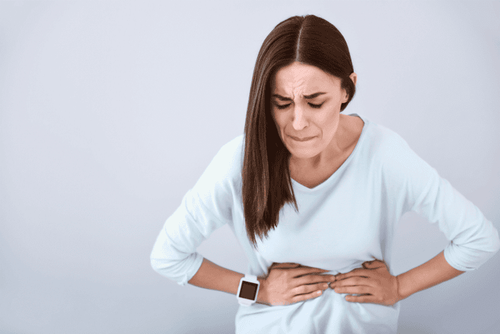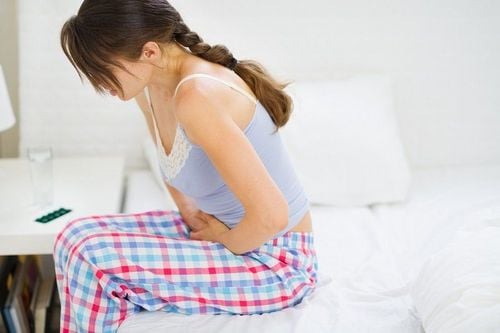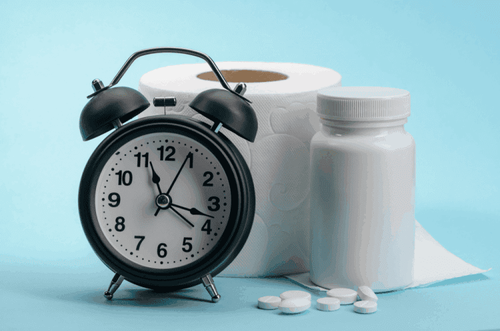This is an automatically translated article.
Women after eating may experience health problems such as stretch marks, scars, etc. Another problem that many mothers are concerned about after giving birth is constipation after giving birth. However, the use of laxatives for postpartum women needs a few points to note.
1. Causes of constipation in postpartum women
Constipation usually begins when the mother is pregnant, peaks after giving birth and lasts through breastfeeding. This is often the result of a combination of different factors, which can include a damaged digestive system, hormonal changes, dehydration, or it can be caused by stress or post-traumatic stress disorder. at birth.
There are many causes of constipation in women after giving birth, the most common causes include:
During pregnancy, it causes pressure on the colon, reducing bowel movements, causing constipation. Constipation occurs, which continues for many months after birth. During childbirth, women often lose a lot of blood, lose water due to fluid production, make the colon not well nourished, leading to constipation. Pregnant women, postpartum often take some vitamins and nutrients such as calcium, iron, then drink milk powder, .... These ingredients have undesirable effects that cause constipation after giving birth. Diet high in protein, eating less green vegetables, tubers, fresh fruits, ... are also causes of constipation. Women after giving birth lose a significant amount of water to make milk for lactation, while drinking less water (for fear of dilute milk), causing dry, hard stools leading to constipation. After giving birth, women are often sedentary, lying in one place, often stressed, inhibiting bowel movements and causing constipation. Postpartum women often have pain when defecating (maybe due to cesarean section or perineal stitches have not healed), making defecation difficult, psychologically afraid to walk, and then refraining from defecation leading to Constipation in women after cesarean section.
2. Is taking laxatives good?
Doctors can prescribe the treatment of constipation with laxatives for postpartum women. Some laxatives that are less absorbed into the blood can be used in lactating women, for example macrogol, lactulose, sorbitol, bisacodyl, docusate, etc. However, to use laxatives properly It is reasonable that you should see a gastroenterologist for a proper assessment of your condition and further advice.
3. Some notes when using laxatives for postpartum women
Laxatives and how to use are issues that many women are concerned about after giving birth. Mothers need to minimize the use of laxatives for postpartum women because the drug can be excreted in breast milk. When your baby sucks on a milk supply that has not yet eliminated all the laxatives, your child inadvertently becomes a passive drug user, causing adverse effects on the baby's health. You can choose a laxative for postpartum women that is less absorbed into the bloodstream, such as macrogol. This is a drug that works to increase the amount of water in the intestine, the volume of water in the intestine is not reabsorbed, so the solution has a laxative effect. At the same time, laxatives for women who have easy bowel movements after giving birth, macrogol has a high molecular weight, so it is neither absorbed nor metabolized in the gastrointestinal tract, and does not affect the nursing infant. If your constipation after giving birth is too severe and despite all the above methods, it is not possible to relieve the constipation. Then you need to use a method of supporting bowel movements that is an enema. However, mothers should also note that they should not abuse enemas to treat constipation in postpartum women. The reason is that the enema will affect the anus causing painful lesions. In particular, the use of enemas through the anus for a long time will relax the anal smooth muscle, leading to the loss of the reflex to push. Therefore, before using any drug as a laxative for postpartum women, it is necessary to consult a treating doctor or a gastroenterologist. Medical experts say that the constant worry and stress of postpartum women also causes constipation and other health problems. Therefore, you should spend time relaxing for yourself in many ways such as: listening to music, cooking, doing light exercise, drinking lots of water, following a high-fiber diet. Fiber is not only abundant in vegetables, but also in whole grains, nuts, whole grains, rice, etc. Usually, postpartum constipation will disappear after a few days to a day. week, so you don't need to worry too much. Changing the daily routine of mothers will feel the constipation gradually decrease. However, if this condition still does not improve after a few weeks and it is necessary to use laxatives to treat it, please contact the medical facilities or hospitals that specialize in Gastroenterology for advice. The doctor examines and treats in the most effective way.
Please dial HOTLINE for more information or register for an appointment HERE. Download MyVinmec app to make appointments faster and to manage your bookings easily.













